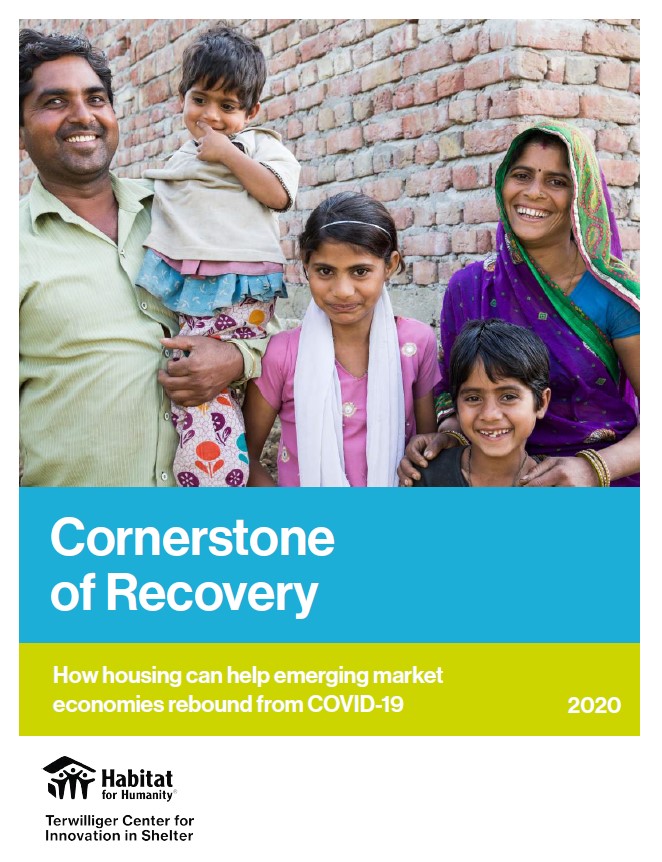Cornerstone of Recovery
How housing can help emerging market economies Rebound from COVID-19

30 June 2020
Anne Myers, Habitat for Humanity International, Malaika Cheney-Coker, Monica Rashkin, Patrick Kelley
English
Report
Africa, Asia, North America, South America
The COVID-19 pandemic has caused a major economic contraction affecting a broad range of economic sectors in countries at all income levels. As of June 2020, the International Monetary Fund was projecting that global Gross Domestic Product would decline by 4.9 percent in 2020 and be 6.5 percent lower than pre-COVID-19 projections by the end of 2021. This economic crisis and the potential for capital market dislocations could have particularly negative consequences for the housing sector, which requires significant capital investments, particularly in many emerging market economies. Additionally, according to a number of sources, this comes at a time when emerging evidence shows that communities with poor housing conditions and limited access to fundamental infrastructure such as water and sanitation systems, have worse outcomes with regards to COVID-19 transmission and deaths.
In response to the joint economic and health crises, there is an opportunity to develop and implement inclusive housing strategies that stimulate the economy and improve community health outcomes. A robust body of research has established that housing is an economic sector with strong multiplier effects on both employment and consumption, particularly in countries with well-developed credit markets. Unfortunately, the design of effective and equitable housing policies in emerging market economies has been hindered by the lack of robust data on housing markets. In particular, the overall contribution of the housing sector to GDP, both through investments that contribute to Gross Fixed Capital Formation and through housing services in the form of rent payments and owner-equivalent rents, is not fully recognised. In addition, existing estimates likely undercount the flow of capital and labour allocated to self-built or incrementally constructed housing, and substantial home-remodelling. After analyzing housing data from 11 emerging market economies, the authors found that the combined contribution of housing investments and housing services represents between 6.9 percent and 18.5 percent of GDP, averaging 13.1 percent in the countries with information about both. This puts the housing sector roughly on par with other key sectors like manufacturing. In addition, if the informal housing sector has been undercounted in the figures used in this analysis by 50 percent or 100 percent, then the true averages of housing investments and housing services’ contribution to GDP would increase to 14.3 percent or 16.1 percent of GDP respectively. As a point of comparison, housing investments and housing services in the US represent 14.6 percent of GDP.
Based on these findings, this report recommends adopting inclusive strategies and stimulus policies directed towards housing markets, including incremental housing markets. These can be an essential part of actions taken by international organisations, governments, non-profits and the private sector to support community and economic resilience during the COVID-19 pandemic and beyond. Depending on the national context, housing sector investments will contribute to improved community health and economic stimulus and stabilisation to varying degrees. In particular, the size of the housing construction sector, the availability of housing finance and serviced land, and the size of housing services in the economy will impact the multiplier effect associated with influxes of capital to the housing sector.
Abstract based directly on source


Comments